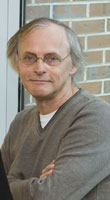"Use of Bibliometric Methods in History and Sociology of Science: From Einstein to DNA" Workshop by Prof. Yves Gingras, May 18
On May 18th Prof. Yves Gingras has delivered a workshop " Use of Bibliometric Methods in History and Sociology of Science: From Einstein to DNA" at the HSE. The event has been organized by theResearch Laboratory of Science and Technology Studies, HSE Institute for Statistical Studies and Economics of Knowledge.
 Yves Gingras is Professor in the Department of History at the University of Quebec in Montreal, former Director of the Interuniversity Research Center on Science and Technology (CIRST), Scientific Director of the Observatory of Science and Technology (OST), and Canada Research Chair in History and Sociology of Science.
Yves Gingras is Professor in the Department of History at the University of Quebec in Montreal, former Director of the Interuniversity Research Center on Science and Technology (CIRST), Scientific Director of the Observatory of Science and Technology (OST), and Canada Research Chair in History and Sociology of Science.In the framework of workshop Prof. Gingras considered the possibility of applying bibliometric methods in the social and historical studies of science. He noted that quantitative bibliometric research in the history of science have become possible recently owing to numerating vast array of historical documents. The lecturer illustrated methodological issues of such studies by the analysis of correspondences by Marin Mersenne (17 century) and Charles Darwin (19 century) with their contemporaries. Co-citation network analysis reveals the intellectual framework of science and its changes over time. Thus, bibliometric techniques make possible the emergence of a new scientometrics field — historical demography of science.
In addition, network analysis of bibliometric data allows identifying patterns of functioning of scientific communities. Considering the historical case of physics Prof. Gingras showed that the Nobel Prize winners were occupying a central position in scientific networks for a long time.
The lecturer analyzed in detail two cases from the history of science — a dispute on Einstein’s pioneering in discovery of relativity theory and the evolution of DNA analytical studies. The results of these original researches were published in leading journals on social studies of science.
At the end of his speech, Prof. Gingras has answered questions from participants. He considered various methodological aspects of applying bibliometric methods in the history of science (the definition of the author’s country of origin, etc.), as well as their heuristic possibilities and limitations for the study of conceptual history of science.

